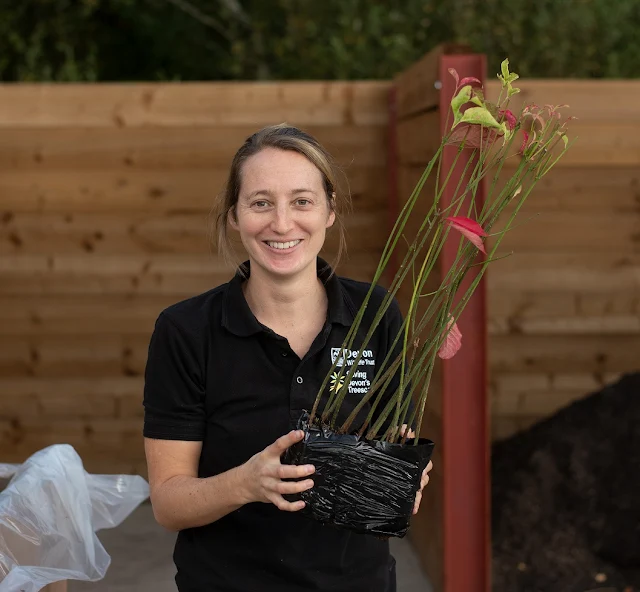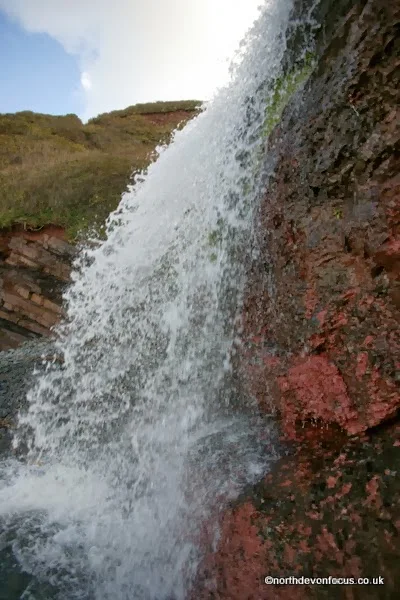Free trees are part of the offer to visitors at a series of special tree events taking place across Devon.
The
Saving Devon's Treescapes project is marking the beginning of National
Tree Week on Saturday 26 November with no less than four simultaneous
tree give-aways, known as 'tree
hubs'. Each begins at 10am and continues until all trees are given
away!
The venues for each event are:
- Devon Wildlife Trust's
Meeth Quarry nature reserve (main car park), near Hatherleigh, EX20 3ER
- Village hall,
Buckland-in-the-Moor, Dartmoor, TQ13 7HN
- Orchard House,
Pyworthy, Holsworthy, Devon, EX22 6SW
- South Brent Old School Community Centre, Totnes Road,
South Brent, Devon, TQ10 9BP
The
biggest of the events is taking place at Devon Wildlife Trust's Meeth
Quarry nature reserve. Entry is free and open to all. As well as being
able to pick up a sapling to
plant at home, visitors will also be able to join a guided walk where
they'll learn how to identify common trees and talk to a woodland
creation adviser from the Woodland Trust about what support is available
if they want to plant more trees.
Staff
and volunteers will also lead tours of the Meeth Quarry tree nursery
which is helping Saving Devon's Treescapes achieve its mission of
planting half a million trees in
Devon by 2025. The stunning work of local landscape photographer,
Robert Darch will also be on display.
The events at Buckland-in-the-Moor, Pyworthy and South Brent will distribute trees only.
Devon Wildlife Trust's Rosie Cotgreave is the project lead for Saving Devon's Treescapes. Rosie says:
"These
are our first tree hub events of what will be a busy winter. Our
mission is to replace trees lost across Devon to the terrible scourge of
ash dieback disease.
Ash
dieback is having a devastating impact on our landscape which is why
it's vital that people are able to plant the right trees in the right
place to ensure we have healthy
and resilient treescapes in future years.
At
each event our staff and volunteers will be giving away sapling trees
of Devon species such as oak, hazel, rowan and crab apple, with a
maximum of five trees per family
group or individual. Every tree will come with an easy to follow guide to its planting, protection and aftercare.
Our stock of trees will be limited to 350 trees at each event, so I'd urge people to get to the venues early."
The Woodland Trust has generously donated trees for the tree hub events. The charity's partnership manager, Eleanor Lewis says:
"The
Woodland Trust is really pleased to be working in partnership with
Devon Wildlife Trust, together we can have a bigger impact.
We need more trees across our landscape. This means replacing not only
the trees lost to ash dieback but also the woods and trees lost over the
past centuries. These new trees will start to reconnect the county's
fragmented woodland and provide important habitats
for our wildlife, as well as acting to combat climate change. If you
have space for a tree, please come along and get involved."
Saving
Devon Treescapes is planning a series of free tree hub events around
Devon throughout the winter. Other dates and venues include
Brixham (Tuesday 29 November), Starcross (Sunday 11 December), Slapton
(Saturday 7 January), Kingsbridge (Saturday 14 January). People are
urged to check the Devon Wildlife Trust website for a full list and for
more details
www.devonwildlifetrust.org/events
Saving Devon's Treescapes is led by Devon Wildlife Trust on behalf of the Devon Ash Dieback Resilience Forum.
It's a partnership project supported by the National Lottery Heritage Fund, One Tree Planted as well as other funders.
More on the work of Saving Devon's Treescapes project https://www.devonwildlifetrust.org/saving-devons-treescapes
Saving Devon Treescapes' Rosie Cotgreave (Photo copyright Devon Wildlife Trust)
---------------------------------
Devon Wildlife Trust
is the county's leading environmental charity, with more than 37,000
members. The charity manages 60 nature reserves across Devon, including a
range of beautiful landscapes such as woodlands, meadows, wetlands and
heaths. Devon Wildlife Trust relies on charitable
donations, grants and the generous support of its members and the
general public to raise more than £5million every year.
Money raised is spent maintaining our work for wildlife conservation and education
in Devon, for present and future generations. More at www.devonwildlifetrust.org
The
Woodland Trust is the largest woodland conservation charity in
the UK. It has over 500,000 supporters. It wants to see a UK rich in
native woods and trees for people and wildlife.
The Trust has three key aims:
- protect ancient woodland, which is rare, unique and irreplaceable
- restoration of damaged ancient woodland, bringing precious pieces of our natural history back to life
- Plant native trees and woods with the aim of creating resilient landscapes for people and wildlife.
Established
in 1972, the Woodland Trust now has over 1,000 sites in its care
covering approximately 29,000 hectares. Access to its woods is free so
everyone can benefit from
woods and trees.











